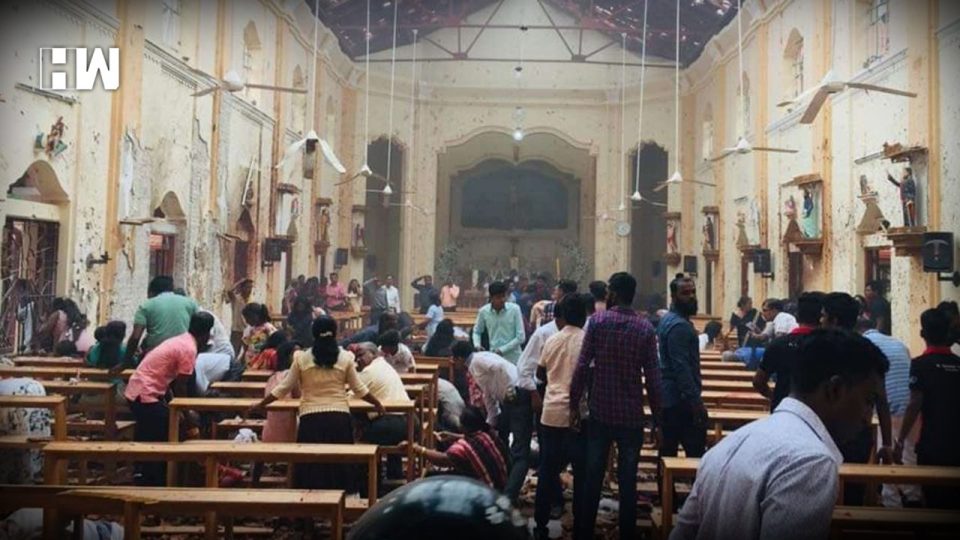Colombo | The death toll in Sri Lanka’s Easter Sunday bomb attacks has risen to 359, police said on Wednesday amidst nationwide search operations to nab the perpetrators of the country’s worst terror attack.
So far 60 people have been arrested in connection with the attacks, police spokesman Ruwan Guansekera said.
“The number of death now is 359,” he said.
More than 500 people have been injured in the bombings.
Defence Minister Ruwan Wijewardene, addressing a press conference here, accepted that there had been a major lapse in security arrangements.
“We (the government) have to take the responsibility. The President (Maithripala Sirisena) is planning to make some changes in the security establishments,” he said.
Intelligence suggested that the attackers were motivated by the Christchurch shootings, the minister said.
“One of the suicide bombers studied overseas. Most of them are well-educated, and come from maybe middle-class or upper-middle-class. So they are financially quite independent and their families are quite stable financially.
“We believe that one of the suicide bombers studied in the UK and maybe later on did his post-graduate in Australia, before coming back to settle in Sri Lanka,” Wijewardene said.
There were nine suicide bombers including a woman involved in the bombings, police spokesman Gunasekera said at the press conference.
“Eight of them have been identified,” he said.
As many as 60 people, all Sri Lankan nationals, have been arrested so far, he said, adding that 32 of them are in the custody of the Criminal Investigation Department.
The Islamic State terror group has claimed responsibility for the devastating Easter blasts in Sri Lanka and identified the suicide bombers who were involved in the attacks.
Seven suicide bombers carried out a series of devastating blasts that tore through churches and luxury hotels in Sri Lanka on Easter Sunday, in the country’s worst terror attack.
Police said that as many as 34 foreign nationals who lost their lives have been identified.
Of them, 10 are from India, three from Denmark, one each from Japan, the Netherlands, Portugal, Bangladesh, Spain, two each from China, Saudi Arabia, Turkey, six from the UK, two holding the US and the UK nationalities and two holding Australian and Sri Lankan nationalities, officials said.
A French national, who was reported as killed in the Ministry media release of April 22, is a case of mistaken identity, they said.
Additionally, 14 foreign nationals are unaccounted for and could be among the unidentified victims at the Colombo Judicial Medical Officer’s mortuary, police said.
Sixteen foreigners injured in the attacks are receiving treatment at the Colombo National Hospital and private hospitals in Colombo.
Police spokesman Gunasekera said that the search operations were carried out during Tuesday night’s curfew hours in different parts of the country.
Many of the arrested people have suspected links to the National Thowheeth Jamath, the group which officials believe carried out the bombings.
Meanwhile, police on Wednesday carried out a controlled explosion of a motorcycle parked under suspicious circumstances near a cinema hall.
The area near the Savoy Cinema at Wellawatta, South Colombo was cleared and the controlled explosion was carried out by the bomb disposal squad to check the motorcycle which had no owner. No explosives were found in the vehicle.
Police said that following the searches, over 10 people were arrested from the Muslim minority concentrated areas of Aluthgama and Beruwela, south of Colombo. Further six were arrested at Katuwapitiya in the western coastal area where the bombed St Sebastian’s Church is located.
Giving information on the suicide bombers, the police said that the attacks at the Cinnamon Grand and Shangri La Hotels had been carried out by two brothers.
The Cinnamon Grand Hotel bomber had booked himself into the hotel on the previous night. CCTV footages have shown his breakfast table where he was seen consuming pieces of fruit and taking a walk around the restaurant before exploding himself.
Their younger brother has also been nabbed by the police. The house search had led to the discovery of extremist literature, a computer hard disk and SIM cards, thought to have been used to coordinate the blasts.
The police has already arrested the accomplices of the bomber of the lodging house near the National Zoo at the Colombo suburb of Dehiwela.
The taxi driver who had taken him to the lodge was also arrested, the police said.
The police suspected the bomber may have been targeting the nearby St Mary’s Church where a large gathering was present at the Easter Sunday mass.
However, the presence of police at the church, who were there due to a previous break into the church by thieves, had prevented the bomber’s entry into the church, officials said.
Speaker Karu Jayasuriya said Parliament would meet on Wednesday to debate the security situation in the country in the aftermath of the blasts.
The emergency regulations which were announced by President Sirisena would be presented for Parliament’s ratification.
The emergency powers allow the security forces to launch crackdown on law and order breaches by sudden searches of property, arrests and detention of people indefinitely.
The Ministry of Education said the reopening of schools had been put off till April 29.
As an independent media platform, we do not take advertisements from governments and corporate houses. It is you, our readers, who have supported us on our journey to do honest and unbiased journalism. Please contribute, so that we can continue to do the same in future.

